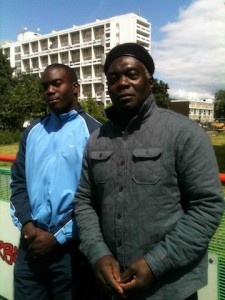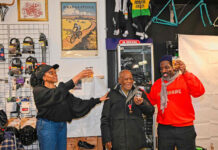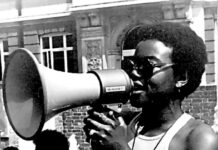
Interview by Zoe Jewell
Tony Moody has been coaching cricket in Brixton for over 30 years and is the founder of the Lambeth Cricket Academy. He developed a type of cricket called Catchy Shubby, a faster-moving game designed with community benefits in mind, to engage, enthuse and develop the confidence of urban children. He even taught one of our editors at primary school…
I came to Brixton from Jamaica at the age of 13 in January. My first impression was not only how cold it was, but there was kind of a uniform look to the houses. I kind of thought it was like a factory. But I liked it. What I liked initially was the birds. Because, coming from the airport, I saw quite a number of birds and the fact that there was no leaves on the trees and I could see the birds quite easily – that just got me.
Brixton is a beautiful place. One of my first experiences was when my mum took me to Railton Road and we went to the market, and I remember listening to all the music from Jamaica – there was a lot of music at the time from Jamaica. It was absolutely wonderful. Because, back home, music is like everything. Every little bar had a jukebox. As kids we would listen to the jukebox and we would dance, just outside the bar or somewhere. It was like that kind of freedom. It was like leaving Jamaica, which was one yard, to come to another yard.
The first week I started at Kingsdale School, it was football season. Because I never had no kit, I had to stand in the line and watch the game, in the cold. But come the summer, they saw me play football in the playground and they knew I could play so they wanted me in the team, because in Jamaica you play virtually every sport. I remember playing the first cricket match – I took five wickets and heard my name on the tannoy. It was very exciting, all of a sudden my name’s being mentioned.
When I left school, I was going to the record shop to buy some records and this old guy said: “hey yout’, you can play cricket?” I said ‘yeah’. Him say, ‘we have a match, come, come and play’. I said ‘I got no kit’. ‘Don’t worry about that, man, just come and play cricket!’ He was Jamaican and he was standing at this off-license door you know. So I said ‘alright I’ll come’. And the first match was at Dulwich. It was the Brixton West Indies team. And I was man of the match! That was my introduction to community cricket. So that was the beginning of it. From there, I would play football in the winter and play cricket in the summer with the Brixton West Indies team.
It was so sweet. That quality of life. The standard thing is that after a game you’d have a drink. You have to compare notes afterwards. You start assessing it emotionally, how it affects you, and you realize that cricket becomes life, rather than just a sport.
They were building the Brixton Rec at the time. When the Brixton Rec was completed, the management decided that on a Thursday they would give two hours to us. Now on a weekday, 2pm, who would pitch up to play cricket? Usually unemployed, drug addicts, all different types of people. So we decided we would set up the Lambeth Cricket Academy. Now we would coach the players to play against county players, so it’s a big step. The first time we beat Surrey, I thought ‘OK, we have the ability to play cricket at a very high level.’ It started with all these different people often with social problems. Since 1972 we played against the police annually until 1995, so there was that social side of things – using cricket as a way of dealing with social problems. So I thought ok, so cricket has to tackle wider social issues.
As we developed, I thought we need to establish a ground. We would go and entertain other clubs, but then they wouldn’t have nowhere to come here. They wanted to come, because they know about Brixton, they know about Lambeth and they know how entertaining we are. So even if we had a home game, it would be away. So we couldn’t invest, we couldn’t do anything, so it wasn’t fun, because politically we weren’t anywhere. And that’s exactly how the youngsters were looking at cricket, as a cul-de-sac. We really need a cricket ground in Lambeth.
When I realized that we could actually make changes with the game it sort of inspired me to stay with it. So I quit my job and I started in the schools in 1995. I’ve coached in well over 32 different schools in Lambeth and in the surrounding areas. Working in Lambeth has given me a lot of satisfaction, because I felt I was doing something. I was making changes, I felt it.
In Jamaica, the way we were taught cricket you have to do everything – you have to bat, bowl and field. So all those three could be found in a game from Jamaica call Catchy Shubby – you have a mental, physical and emotional element. Now, if you have it in perfect harmony there’s a possibility that a storehouse of original thoughts can emerge.It allows some people who are not physically minded to bide their time and move in a specific way.
We’ve identified a site which is at St Agnes Place, down in Kennington. The Rasta HQ used to be there. It’s a beautiful site in terms of community cricket, because of the skyscraper flats. The only thing going for it at the moment is my determination over the years. Because it’s a public space, I realize now it’s a political decision.
I have taught cricketers who play county cricket now and still are prepared to go and wash other people’s cars. They don’t feel above it, because it’s a community thing. Do you understand? They’ll do anything because the community’s first. Having those three forces in unison – it’s about how you deal with your social responsibility and to me that is the key. These kids I’ve dealt with, they understand about their social responsibility.
Interview by Zoe Jewell





I spent 13 years in Jamaica returning to the UK in 1979 Ketchy pushy was played long before I got there and continues to be popular in schools, the streets or wherever it is possible to bowl a bamboo root, stone and tar, young orange or anything suitable as a ball and bat with coconut bow or bats shape from pieces of wood..I therefore challenge the phrase developed a game
wagwaan Rasta
I remember Mr. Moody, he used to come to my school, Stockwell Primary School and used to teach my year group when I was 10 (I am now 26), he used to make fun of me for being so dark skinned and as a left hander I used to bat on my right side for some reason. Good to see Mr Moody and good to see that he is still doing something positive for the community.
[…] BRIXTON PEOPLE: Tony Moody, cricket coach […]